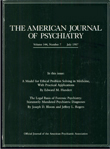False positive results: a challenge for psychiatric screening in primary care
Abstract
OBJECTIVE: The goal of this study was to characterize primary care patients with false positive results on screens for mental disorders. METHOD: A sample of 1,001 primary care patients completed self- administered screens and structured interviews for DSM-IV diagnoses. RESULTS: A substantial proportion of the patients with false positive screen results for at least one diagnosis met the diagnostic criteria for other psychiatric disorders. They also had significantly greater functional impairment and higher rates of recent use of mental health services than the subjects with true negative results on the screens. CONCLUSIONS: Although the positive predictive values of screens for specific mental disorders are in line with those of other medical screens, false positive results are not uncommon. This may be due in part to the sensitivity of brief screening instruments to nonspecific symptoms. The results suggest that as with other screens used in primary care, patients with false positive results on screens for mental disorders should receive clinical attention.



